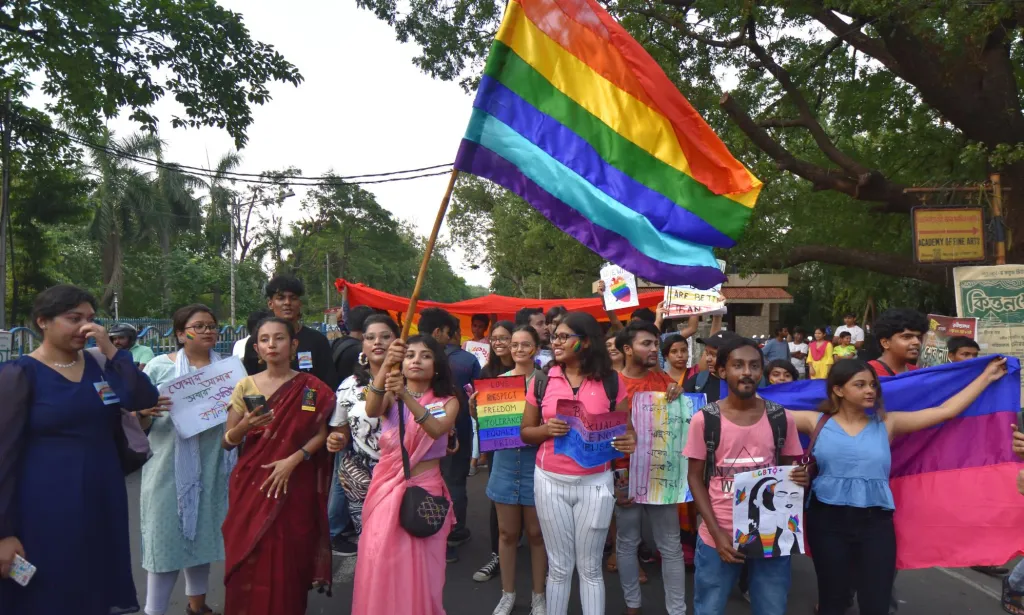India Supreme Court fails to legalise same-sex marriage
Sign up for more LGBTQ+ news and updates at TrueQueer.
India’s Supreme Court has made the decision to decline the legalization of same-sex marriage after a long campaign and public support for a change in the law. The five-judge bench at the top court was divided over the decision, resulting in four separate judgments being written by the bench. Ultimately, the judges issued a 2-3 decision and refused to recognize same-sex marriage, stating that it should be left to the legislature to decide rather than the courts. However, the bench did emphasize the rights of the LGBTQ+ community to be free of prejudice and discrimination.
Chief Justice of India Dhananjaya Yeshwant Chandrachud delivered the judgment on Tuesday, acknowledging that there was both agreement and disagreement within the final ruling. He highlighted that queerness is not limited to urban or elite communities, but can be found across all sections of society. Chandrachud also pointed out that the institution of marriage in India has changed over time, citing examples such as widow remarriage and interfaith marriage. He argued that marriage is not a static institution and has undergone significant changes through legislation.
While LGBTQ+ couples are free to celebrate their commitments to each other in any way they wish, this ruling does not extend the right to claim any legal entitlement or status for their union or relationship. The Supreme Court also issued several directions to the government, including ensuring that the queer community is not discriminated against, sensitizing the public to queer rights, establishing safe houses and a hotline for LGBTQ+ individuals, and recognizing a citizen’s right to enter into a union with their life partner.
Currently, queer couples in India are only allowed to live together in “unregistered cohabitations” without enjoying the rights and benefits afforded to heterosexual married couples. Earlier this year, LGBTQ+ couples and activists filed petitions pleading for legal recognition of their marriages, arguing that India is a marriage-based culture where LGBTQ+ individuals should be able to participate fully. They specifically requested updates to India’s 1954 Special Marriage Act (SMA), which currently allows for interfaith and inter-caste marriages. LGBTQ+ advocates have called for a broader interpretation of the legislation to include same-sex marriage.
The Indian government opposed these pleas, describing the calls for legal same-sex marriage as urban elitist and arguing that it goes against the traditional Indian family unit concept. It claimed that legalizing same-sex marriage would seriously affect the interests of every citizen and that the issue should be decided by parliament, not the court. However, Chief Justice Chandrachud dismissed these claims, stating that queerness is not limited to urban or elite communities and should not be erased.
Leaders from India’s main religions also united in opposition to same-sex marriage, arguing that marriage is primarily for procreation rather than recreation. Despite this opposition, the five Supreme Court judges took on the case, promising not to interfere with religious personal laws but to consider whether existing legislation, such as the SMA, could be updated to include LGBTQ+ individuals.
If same-sex marriage were to be fully legalized in India, the country’s family laws would need to be updated to grant LGBTQ+ individuals the legal right to marry. This would enable them to claim the status of “spouse” for financial, medical, insurance, and inheritance matters. Currently, only two Asian countries recognize same-sex marriage: Taiwan (since 2019) and Nepal (since 2023).
India’s Supreme Court ruling reflects a gradual shift towards more accepting and pro-LGBTQ+ rhetoric in the country. In 2018, the Supreme Court overturned the colonial-era criminalization of gay sex. A Pew survey conducted in June found that 53% of Indian adults believed that same-sex marriage should be legalized. While the Indian government estimated in 2012 that the LGBTQ+ population was around 2.5 million, local activists argue that LGBTQ+ individuals actually account for at least 10% of India’s population, or approximately 135 million people.
In conclusion, India’s Supreme Court has declined the legalization of same-sex marriage, stating that it is the responsibility of the legislature rather than the courts. However, the court emphasized the rights of the LGBTQ+ community to be free of prejudice and discrimination. The ruling does not prevent LGBTQ+ couples from celebrating their commitments to each other, but it does not grant them any legal entitlement or status for their union or relationship.
Follow us on: Facebook for more LGBTQ+ news and updates at TrueQueer.
“India same-sex marriage ruling”
![]()

